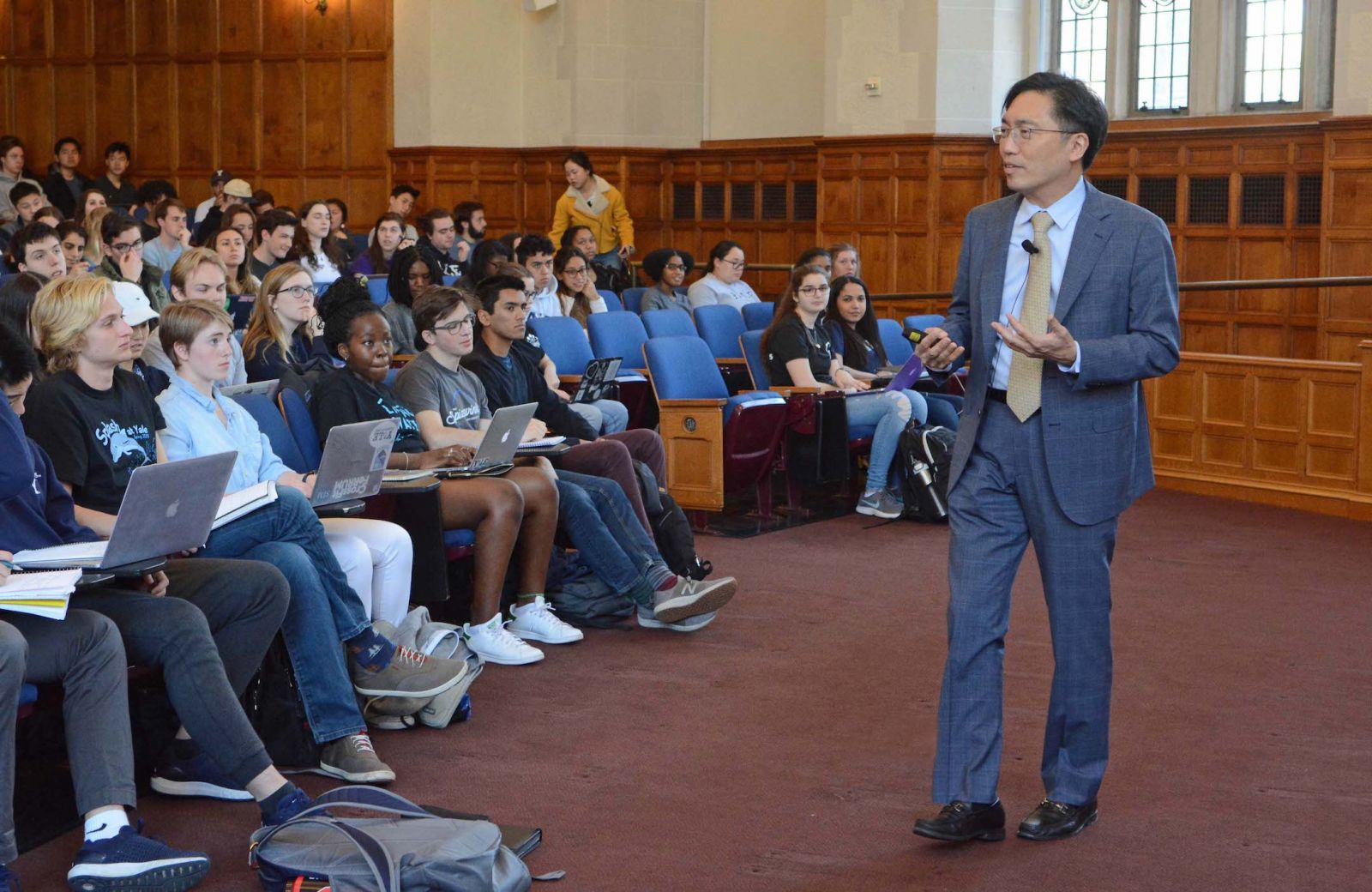Teaching Excellence at Yale
Dean Marvin Chun increases engagement and prioritizes feedback in a large lecture course
Large lecture courses pose challenges to engaging students during class and providing timely feedback on their learning. In his spring 2019 Introduction to Psychology course, Dean of Yale College and Richard M. Colgate Professor of Psychology Marvin Chun implemented two digital tools to address both of these long-standing issues. During class, he interspersed lecture content with wireless polling, collecting live input from students on relevant psychological topics through the Poll Everywhere platform. Outside of class, his Teaching Fellows were freed from time-consuming grading logistics by the Gradescope tool, which allowed them to focus on giving students fair and timely feedback.

Professor Chun’s prize-winning instruction of the Introduction to Psychology course is highly regarded among Yale students. “I have taught this course often, and part of the joy is finding ways to improve it each time,” Chun explained. “I like to experiment with new technology to improve the experience for students.” Poll Everywhere allows students to individually respond to questions through their personal digital devices and enables faculty to collect and display live data. This tool engages students in discussions about course content in a manner that scales effectively to large classes.
Now supported broadly at Yale, Poll Everywhere solves issues that plagued classic clickers such as dead batteries and reliance on students to bring an extra physical device. “I can easily flip between anonymous and registered feedback, either to collect sensitive answers privately or to award participation credit,” comments Chun. He designs survey questions to align with social science studies, using the power of live, aggregate data to show how class responses match established theories about human behavior. In one example, he asked students to report how many hours they sleep, a question he has been tracking for over a decade. Interestingly, this semester’s class reported an average of over 7 hours of sleep, notably up from prior averages in the 6-6.5-hour range. Early in the semester, he implemented a values affirmation exercise designed to mitigate stereotype threat and shown to reduce achievement gaps. Students wrote a paragraph, then used Poll Everywhere to report their most important value. Their input was displayed in a word cloud for everyone to reflect on. “Students really get into it,” reported Chun. “The interactive surveys help to make the lecture time more engaging, and the immediate feedback is rewarding to students, making the content more memorable. Poll Everywhere makes it possible to conduct such surveys with ease.”
For a course with hundreds of students, the logistics of grading three tests with multiple choice and short-answer questions can be “nightmarish,” to quote Chun. Gradescope drastically simplifies the logistics, easily allowing TFs to grade a single question across exams and check answers against a convenient rubric. “Game-changing” is Professor Chun’s succinct endorsement of Gradescope.
By monitoring the question-by-question data, Chun is able to correct issues as they arise. This semester, he identified occasional problematic questions and handled them by giving credit for a second option – an instant adjustment that would not have been feasible otherwise. He reported retracting two questions this term, based on response statistics and petitions that demonstrated confusing interpretations. His teaching fellows loved the tool as well. They spent much less time on logistical tasks and devoted more time to giving students feedback to improve their learning. “Using Gradescope helped increase the validity of grading and the integrity of our exams,” asserts Chun. “These outcomes are important for our students.”
Both of these tools contribute to a more inclusive learning experience, which can be especially elusive in large lecture courses. When Poll Everywhere is used to collect student input, students realize they are not alone and appreciate the message from the instructor that every voice counts. Gradescope facilitates fair and consistent grading practices, such as giving one TF a single question to grade across all exams. In addition, the tool makes blind grading easier for faculty and TFs, therefore reducing the influence of personal and unconscious biases. Professor Chun’s use of digital tools has contributed to a much more engaging (and fun) learning environment.
Instructors at Yale should contact the Poorvu Center askpoorvucenter@yale.edu to find out how to integrate Poll Everywhere or Gradescope into their classes.
Research exploring the benefits of engaging students with in class activities:
Researchers at the University of Colorado and Yale University offer evidence that a brief values affirmation writing assignment can improve the grades of and reduce the achievement gap for underrepresented students. Read “Reducing the Racial Achievement Gap: A Social-Psychological Intervention” online via Science.
Researchers at Washington State University conducted a meta-analysis of wireless polling studies and found mixed results on measures of student cognition. Their analysis points to the need for thoughtful implementation of pedagogical principles when designing these in-class activities. Read “A meta-analysis of the effects of audience response systems (clicker-based technologies) on cognition and affect” online via Computers & Education.
Researchers at Worcester Polytechnic Institute and Dartmouth College examined the introduction of clickers in an introductory physics course. The clickers had an immediate effect on “engagement, learning, and efficiency.” Read “In-class use of clickers and clicker tests improve learning and enable instant feedback and retests via automated grading” online via Physics Education.
Research exploring the benefits of engaging students with in class activities:
The Poorvu Center has a variety of resource guides online, including an article about using audience response systems with students, strategies for teaching large classes, and recommendations for inclusive teaching. A recording of the 2019 Canvas Lightning Talks – featuring Poll Everywhere and Gradescope – will be posted on the Poorvu Center website by May 17.
Share with us or a colleague:
View or download a PDF version below. Send us your feedback and suggestions. To opt-out/opt-in to this newsletter, please visit Yale’s messaging service website and follow the on-screen instructions.
